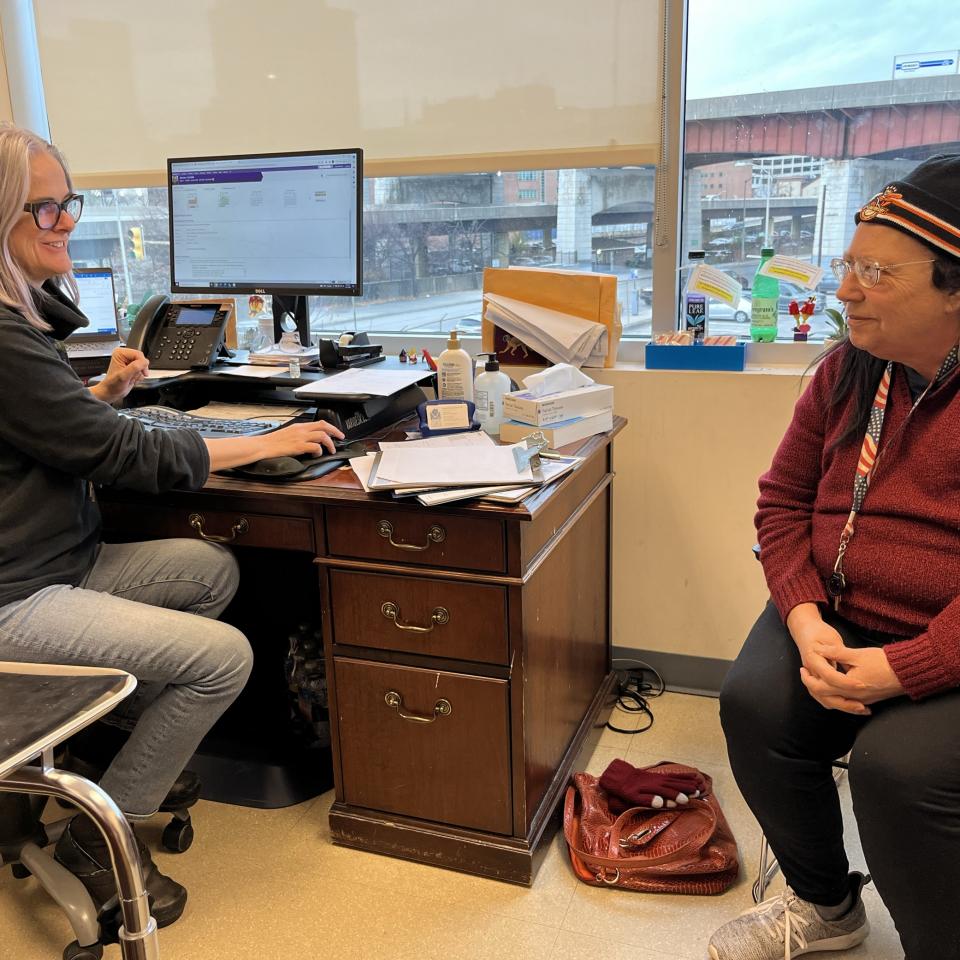We couldn’t be happier to welcome back Erick Torres, RN to the agency as our new Director of Nursing. Erick earned his Bachelor’s of Science in Nursing at Miami Dade College and brings six years of nursing and nurse management experience. A true team player, Erick’s years in our Pediatric & Family Clinic demonstrated his enthusiasm for the work, easy rapport building with clients and passion for collaboration. Get to know him in this Q&A.


01.25.24
Photo: Marian (right) checks in with psychiatrist Dr. Meredith Johnston every month.
"I come and get my shot here every month,” Marian says. “I don’t miss any days.”
She’s here at our downtown clinic for a check-in with Dr. Meredith Johnston, director of psychiatry, who she's been seeing for five years. And while it might sound like a simple statement, Marian would be the first to tell you that getting to this place of regular care took a long time.
Like many people who have had to navigate the mental health care system, she's had painful experiences when seeking care.
“In 1990, I was in the hospital for a month with pneumonia and I was diagnosed with HIV,” Marian remembers. “My doctor took me to mental health court in Delaware. The judge forced me to comply with treatment. I wasn’t allowed to leave the state for a year.”
Rebuilding trust after negative experiences with mental health care can be daunting. “A lot of the people we see have had traumatic experiences with medication,” Meredith explains. “You might have had your first brush with mental health care by way of the police or ending up in handcuffs at the ER.
“As a physician, I have to name and acknowledge that experience,” she says. To help build back a sense of control and trust, Meredith and other psychiatrists on the Behavioral Health team at Health Care for the Homeless emphasize autonomy and shared decision-making.
Finding the right kind of treatment can be a long journey for anyone, but trusting clients’ expertise in what works best for their health is an important first step.
“I will not take the pills; I don’t like how they make me feel,” Marian says. And she pays attention to which medications give her more energy. “Dr. Johnston is good. She knows all this stuff.”
With time, Marian and Meredith found a regimen that works—a long-acting injectable antipsychotic, or LAI. LAIs work well for a lot of clients that Meredith sees, who might find it difficult to hold onto and take a medication every day. Marian says, “You have to stay on time every month and it will work. But it’s a little bit of progress at a time, and other people will notice it before you do.”
“For a lot of people, it’s been a hard road with medication,” Meredith says, “but sometimes you just find life is better on it than off it. If a shot can help you stay out of the hospital, stay housed, be more stable—that can be amazing.”
Being able to get a range of care under one roof also helps. Marian has both a psychiatrist and a therapist—and she can also get her HIV treatment, her primary care and occupational therapy all here. Meredith says, “We can really individualize it for what the client needs and that establishes a lot of trust.”
Marian is taking marketing and computer classes through B’More Clubhouse, a local nonprofit. “I’m trying to keep stability. I have an occupational therapist here, he’s helped me set up a routine—that’s just basic life skills: wash my face, brush my hair, change clothes, and then I have these classes that I’m incorporating—I’m picking up math and computer skills. It’s hard, it’s stressful. But I want to fight the battle. I want to go back to school and try one more time.
“I don’t know if I’m managing my mental health—I’d have to get a manager involved for that,” Marian jokes. “Just dealing with it and coping with it how I can, that’s enough.”
More Recent News
Transgender Day of Visibility is dedicated to celebrating and raising awareness about the transgender community worldwide. The day aims to promote greater understanding, acceptance, support, and inclusivity for transgender people.
March welcomes Women’s History Month. We come together to honor all those who experience life through the lens, body, spirit, and identity of a woman. Explore a few ways you can celebrate Women’s History Month— past, present, future, and fluid— in 2025.
February 1st marks the start of Black History Month. During this time, we have a chance to focus on the significant role Black populations have played in shaping the world and to celebrate their contributions to society that have often gone overlooked.